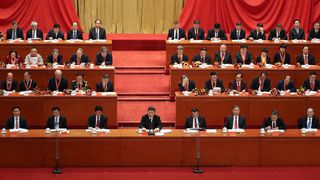There is increased appreciation by Prime Minister Scott Morrison and others that the economic tensions between the US and China were not simply driven by an irrational US President. The tariffs may be Donald Trump's, but they have brought the real cause of tensions into the open: structural imbalances in the world economy and rising intolerance of China systematically breaking World Trade Organisation and other trading rules over an extended period.
For example, these pages ran a piece yesterday by a former director of the OECD arguing that enormous global economic imbalances have resulted from a Chinese model which artificially prioritises savings and investment over consumption. This causes Chinese firms to flood global markets with excess goods, destroying the prospect of reciprocity with most of its trading partners.
The tariffs may be Donald Trump's, but they have brought the real cause of tensions into the open: structural imbalances in the world economy and rising intolerance of China systematically breaking World Trade Organisation and other trading rules over an extended period.
That analysis is accurate but incomplete. The imbalances are not the result of some mechanistic economic dynamic like the involuntary movement of one billiard ball hitting another. Rather, it is the consequence of two related phenomena driven by deliberate political intent: a Chinese political-economy which has been engineered to ensure the Communist Party remains in power; and the party's determination to reshape international commerce in a way that guarantees China's - and therefore the party's - continued success.
First, the domestic picture in China. The party has a long-standing social-political contract with its people: it will oversee rapid growth in exchange for uncontested obeisance from citizens. To achieve that, the party retains control over all key economic levers. Of highest importance is the banking sector which is state-controlled and which supplies most of the formal finance to corporate firms and households.
Around four-fifths of all normal loans from Chinese banks go to state-owned enterprises (SOEs) at artificially low rates. SOEs are offered hidden subsidies, tax advantages and regulatory protection - much of it against the spirit and/or letter of WTO rules. This is despite return-on-investment of SOEs being three times lower than their private firm counterparts. The latter are mostly forced to borrow at significantly higher rates, including from the so-called shadow-banking or unregulated lending markets, even though the private sector accounts for about half of the country's tax revenue, about 60 per cent of GDP and 80 per cent of urban employment.
This is not about China competing better in a globalised economy but ensuring a pre-determined outcome for China of globalisation into the future. That goes against the fundamental principle of an open and liberal global economic system.
Why does Beijing sustain this economic perversity? Because SOEs are there to ultimately fulfil party objectives. If there is an impending and structural slowdown, they can be forced to invest even when it does not make commercial sense to do so. They can be persuaded to invest in strategic sectors nominated by Beijing as being of high importance and in each other to enhance their collective presence in that market. At the provincial level, local SOEs effectively provide direct fiscal income for local governments which lightens the burden on the central government. More generally, that model allows the party to offer and retract largesse and opportunity. What better way to ensure that the middle class is on side?
This set-up creates a system which promotes and rewards over-borrowing, over-investment and excess capacity. The game-plan for SOEs is to increase presence and revenue rather than profits. At the same time, growth in disposable income for households has halved over the past five years under this 'advance of the state, retreat of the private sector' model as a growing percentage of national wealth (and debt) remain on the books of SOEs.
It is for this reason that China is consuming a declining proportion of what it produces with the only option being to flood international markets.
Reshaping international commerce
Second, the reshaping of international commerce. The party has updated its contract with the people. Its authority to remain in power will also depend on the party leading China to economic dominance. This is not an illegitimate goal but the means by which it is pursuing that objective is.
In some respects, Xi Jinping has unwisely, and too openly, declared his hand. Consider his two signature policies, Made in China 2025 and the Belt and Road Initiative. Previously, and inherently distrustful of the impartial operation of global markets and supply chains, China wanted to reduce its reliance on foreign technology and innovation. The Chinese state now seeks to ensure Chinese firms become the dominant global players and chief exporters in the advanced sectors that will create and hold value in the future.
How will it do that? Through extensive financial assistance to SOEs and 'national champions' such as Huawei, preferential access to credit, and the forced and even illegal acquisition of foreign technologies and intellectual property.
With respect to BRI, much attention has been focused on so-called 'debt-trap' diplomacy. More serious are the ambitious plans to redefine standards, protocols and rules to suit China; hard and soft infrastructure throughout Eurasia and the Indo-Pacific that begins and ends at China; and bilateral preferential economic agreements that lock out Western firms and produce guaranteed economic rents for Chinese entities. A Centre for Strategic and International Studies Reconnecting Asia Project report on Chinese-funded transportation projects in BRI-designated areas reveals almost nine out of 10 firms involved are Chinese. As more projects are completed, the second wave of opportunities for companies offering different products and services are mainly Chinese.
This is not about China competing better in a globalised economy but ensuring a pre-determined outcome for China of globalisation into the future. That goes against the fundamental principle of an open and liberal global economic system.
The structural imbalances are the effect. But the cause of the disputes is deeply political, meaning they will be with us for a long time.






